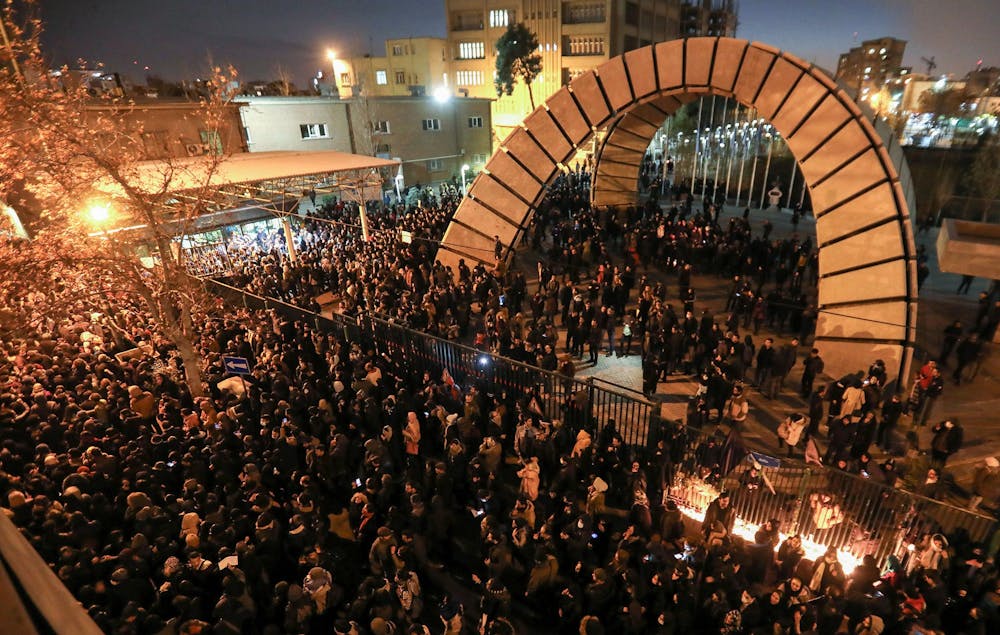By Nabih Bulos, Sarah Parvini
Los Angeles Times
Anti-government protests continued for a second day across Iran amid fury over the military's admission it had downed a Ukrainian International Airlines jetliner near Tehran last week, killing all 176 of its passengers.
The demonstrations mark yet another crisis for Iran's leaders, who have been blamed for a weakening economy even as they cope with the Trump administration's targeted killing of a top general, Qassem Suleimani, in Iraq. The downing of the commercial aircraft, which military leaders acknowledged Saturday they had done by mistake, came after their firing missiles at military bases in Iraq as a response to the White House.
Hundreds of protesters gathered in Azadi Square in downtown Tehran on Sunday, blocking roads around the square even as authorities dispatched riot police to force them open.
There were also reports of demonstrations spreading to other cities, including Shiraz, Ahwaz and Babol. The protesters excoriated the country's top officials, including Supreme Leader Ayatollah Ali Khamenei for what many saw as incompetence of the military establishment as well as the delayed acknowledgment of error after three days of denials.
"Our shame, our same, our stupid supreme leader," shouted a group of demonstrators in Azadi Square in a video posted to social media on Sunday. "Death to the dictator!" and "We don't want an Islamic Republic!" other videos showed.
Anger has continued — and even grown — despite expressions of contrition from Iranian officials, including Gen. Amir Ali Hajizadeh, head of the elite Islamic Revolutionary Guard Corps' airspace unit that was responsible for downing the plane.
"I wish I were dead and such an accident hadn't happened," said Hajizadeh at a press conference Saturday. He did not offer his resignation.
The protests come after a moment of unity in Iran over the U.S.'s slaying of Suleimani, head of the Revolutionary Guard Corps' Quds Force and an important leader seen as a bulwark against Islamic State.
His killing brought tensions to a fever pitch between Washington and Tehran, leading to jittery Iranian military personnel firing surface-to-air missiles at what they thought, officials said, was a U.S. cruise missile attack but which actually was Ukraine International Airlines Flight 752.
Among the victims were dozens of Iranians, many of them students. Their alma maters were the site of protests Saturday evening.
Video posted Sunday showed students at Tehran's Shahid Behesthti University walking around an American and an Israeli flag that had been painted on the floor suggesting that their beef was not with those nations but with Iranian leadership. As a Basij officer walked over the painted area, the crowd began to shout and called him "dishonorable" — an affront in Iranian culture.
The protests have garnered international scrutiny amid fears of a crackdown by security forces. "To the leaders of Iran - DO NOT KILL YOUR PROTESTERS. Thousands have already been killed or imprisoned by you, and the World is watching," tweeted Trump. "More importantly, the USA is watching."
Britain too issued a complaint over the detention of its ambassador to Iran, Rob Macaire, which it said was "a flagrant violation of international law."
Macaire, later released, said he had come to pay respects at what was said to be a vigil for the victims of the doomed Ukrainian flight. He added in a tweet that he had left after five minutes when chanting broke out.
Iran summoned Macaire for his attending "an illegal rally," according to a statement from Iran's foreign ministry. Later that day, pro-government demonstrators burned U.K. and U.S. flags.
Despite the discontent, it remains unclear whether the protests represent a strong threat to the country's rulers.
"We are seeing Iran's population of over 80 million growing increasingly polarized and frustrated based on various issues. Some over the economy, others over corruption, lack of political freedoms, Suleimani's assassination, and mismanagement across most branches of government and military," said Ellie Geranmayeh, an Iran expert at the European Council on Foreign Relations. "The support base for the Islamic Republic is getting smaller and more segments of Iran's population are questioning the legitimacy of its leaders - but nevertheless the support for the ruling elite remains powerful enough (no matter its shrinking size) to maintain its survival."
Staff writers Bulos reported from Baghdad and Parvini from Los Angeles.




